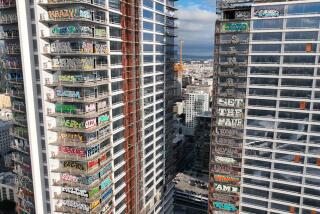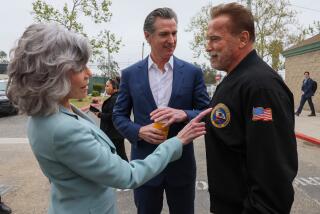Anti-Drilling Ad Charges 1969 ‘Rip-Off’ on Site
Borrowing a strategy that helped propel Tom Bradley into the mayor’s office in 1973, the man who wants to unseat him charged Thursday that a 1969 land swap giving Occidental Petroleum Corp. its controversial Pacific Palisades drilling site “ripped off” the people of Los Angeles.
Councilman Zev Yaroslavsky, in a new campaign commercial unveiled on behalf of anti-drilling measure Proposition O, says: “Big money to politicians. Secret land deals. Reads like a cheap novel. . . . For years Occidental has schemed to drill for oil. . . .”
The new ad begins airing today and is reminiscent of a 1973 commercial starring then-Councilman Bradley that ran at the height of his bitter campaign against Mayor Sam Yorty. In that ad, Bradley lambasted both the Occidental drilling project and the negotiations that led to it. His strong opposition to Occidental’s plans was cited as a key element of his subsequent victory.
In 1985, however, Bradley reversed his anti-drilling stand and signed the ordinances authorizing Occidental to develop its two-acre site.
Despite the parallels between the 15-year-old Bradley spot and the Proposition O ad, Yaroslavsky denied he is using the airwaves for an early start to his expected bid against the four-term incumbent next year.
Link to Mayor’s Race Denied
In an interview, Yaroslavsky said: “This campaign is not about any other election. It’s about Proposition O and Proposition P (which would protect the drilling project).
“Tom Bradley and I are on different sides of the issue here; there’s no question about that,” Yaroslavsky said. “If people interpret (the commercial) in some fashion, that’s their business. There are going to be a number of commercials in connection with this campaign; this is just one of them and it’s not even the most prominent one.”
In other ads, state Controller Gray Davis and Rep. Mel Levine (D-Santa Monica) warn viewers of dangers that they attribute to the Occidental project.
Officially, Bradley is neutral on the two drilling measures, but Thursday, Yaroslavsky pointedly noted the mayor’s approval of the 1985 drilling ordinances. And, to underscore his differences with the mayor, Yaroslavsky resurrected a 15-page Bradley press release issued only days before his historic 1973 victory. In it, Bradley had called for a county grand jury probe of the deal that involved Occidental exchanging some Potrero Canyon land it owned in the Palisades for a site across from Will Rogers State Beach that the city would buy from the state.
Calling the 1969 land swap a “Watergate West,” candidate Bradley said at the time that the Yorty Administration--acting in concert with Occidental--had engaged in a “conspiracy to defraud the state. . . .”
The county grand jury later investigated the deal, finding no evidence of criminal activity. But a City Council committee found a number of irregularities, blaming city bureaucrats, the Yorty Administration and Occidental for engaging in negotiations that were not intended to get the best possible deal for the city.
Taking several years to complete, the controversial land swap involved Recreation and Parks Department officials who wanted five acres of Potrero Canyon land that Occidental controlled to complete a park the city had been piecing together for years. A trade was proposed calling for Occidental to surrender the canyon property, which it maintained was worth $20 million and needed for its Palisades drilling operations. In exchange, the company would accept the two-acre site across Pacific Coast Highway from Will Rogers State Beach.
For almost 20 years, a debate has raged over whether Occidental sought the trade to acquire a better drilling site or agreed to it reluctantly.
Facts Not Released
Both Occidental and park officials were criticized for concealing certain key facts about the swap. Occidental representatives, for instance, admitted they failed to tell city officials that the five-acre sloping canyon site was merely one of several drilling locations under consideration and would have cost more than $1 million to prepare. Had those facts been known, legal experts said later, the city could have condemned Occidental’s Potrero Canyon land, paying a low price for it instead of the $20 million the company said it was worth.
As it turned out, the city wound up paying Occidental $175,000 for the Potrero Canyon land as well as $34,000 to the state for the coastal site.
Park officials, meanwhile, were criticized by the council committee for misleading state officials into believing for more than a year that the coast highway drilling site was needed to relieve an acute beach parking problem. What the city really wanted and eventually obtained after Yorty’s office lobbied the state was a deed restriction that permitted only oil drilling on the site.
“The people of this city got ripped off by Occidental Petroleum with the help of Sam Yorty and his cronies,” Yaroslavsky said. “The taxpayers of this city paid Occidental $175,000 to take a piece of land Occidental now says is worth $900 million, in the most corrupt rip-off in city history.”
For weeks, backers of Occidental-backed Proposition P have contended that the land swap amounted to the first step in a legal commitment to the company to permit drilling and that if Proposition O prevails on Nov. 8, the city will be sued for more than $1 billion. Despite the cloud that has hung over the deal all of these years, Occidental attorney Mickey Kantor said Thursday, “No action was taken by any agency as a result of that swap that called anyone into question.”
Kantor added that while there “are a number of issues” involved in the current campaign between the rival drilling measures, “the fact is, obviously this campaign to some degree is part of Zev’s effort to run for mayor next spring.”
More to Read
Sign up for Essential California
The most important California stories and recommendations in your inbox every morning.
You may occasionally receive promotional content from the Los Angeles Times.









